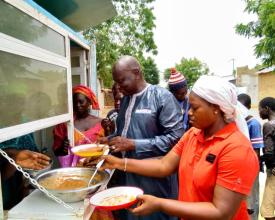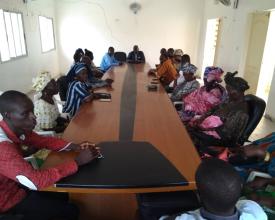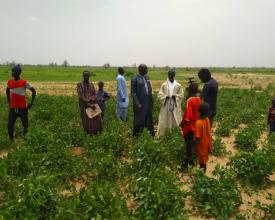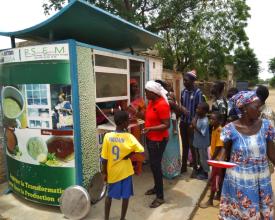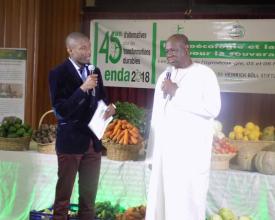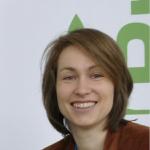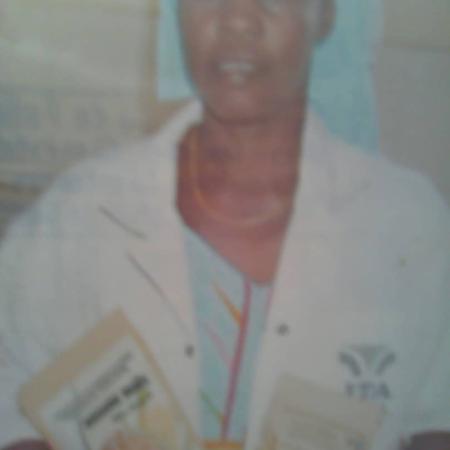
Programa de Desarrollo Agrícola de Ndiob
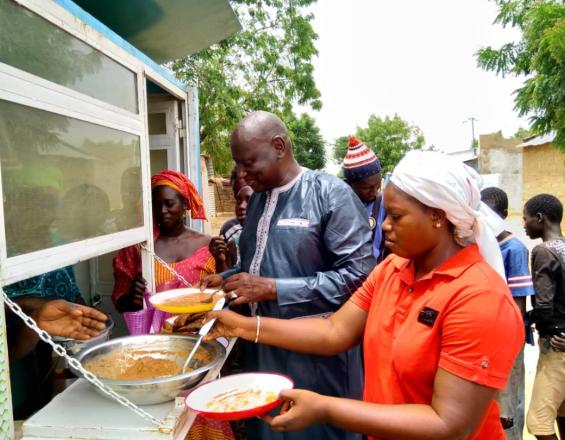
Ndiob se convirtió en la primera ciudad de Senegal en embarcarse en una transición agroecológica. Diseñados en una gran consulta comunitaria, los ciudadanos de Ndiob formularon su Programa de Desarrollo Agrícola, que incluye cinco prioridades: seguridad alimentaria, gestión de los recursos naturales, fertilidad del suelo, ganadería y agricultura. Como resultado, la ciudad invierte ahora un notable 23% de su presupuesto total en lograr una transición agroecológica y emprende una notable serie de medidas apropiadas y adecuadas para gestionar de forma sostenible sus recursos naturales y lograr la seguridad alimentaria. Con su enfoque territorial comunitario de múltiples partes interesadas, las estrategias políticas de Ndiob fueron reconocidas con una Mención de Honor del Future Policy Award 2018, otorgado por el World Future Council en colaboración con la FAO e IFOAM - Organics International.
Contexto
Défis à relever
Ndiob es una comunidad rural, con una población oficial estimada de aproximadamente 20 000 habitantes en 2018, con una superficie de 127 km2, a unos 160 km al este de Dakar, Senegal. La población de Ndiob se compone principalmente del grupo étnico de los Serers, que es el tercer grupo étnico más grande de Senegal constituyendo el 15 % de la población senegalesa. Hace unos 50 años, la ciudad de Ndiob se autoabastecía de alimentos. Las cosechas eran abundantes y la fauna y la flora de notable riqueza. Las frutas y la leche no se comercializaban en aquella época. Debido al considerable deterioro de la situación socioeconómica, hoy en día las cosas han dado un giro negativo. Sin embargo, gracias a los procesos de descentralización en curso en Senegal, el municipio tiene ahora más autonomía para la gestión de la tierra y los recursos naturales, que, si se gestionan con prudencia, pueden proporcionar seguridad alimentaria y prosperidad económica.
Ubicación
Procesar
Resumen del proceso
En primer lugar, Ndiob comenzó por desarrollar una visión y un programa (BB1), y a continuación diseñó, sobre la base de dicha visión, su Programa de Desarrollo Agrícola de Ndiob (BB2). El programa desarrollado guía la implementación en Ndiob (BB3) y sirve como modelo transferible para la red de ciudades REVES y más allá (BB4).
Bloques de construcción
Desarrollar una visión y un programa
Ndiob es el primer municipio que puso en marcha el enfoque territorial del desarrollo rural en Senegal. En junio de 2014, se instaló un nuevo consejo municipal, que definió y adoptó formalmente su visión de "hacer de Ndiob un municipio verde, resiliente a través de un proceso de desarrollo económico y social y de bienestar, inclusivo y respetuoso con los derechos humanos, en particular con las comunidades vulnerables". Esta orientación ya había sido definida por los miembros del municipio durante la campaña electoral y, posteriormente, también había sido respaldada por el Partido Verde de Senegal.
Para poner en práctica su visión, el municipio -dirigido por un alcalde muy comprometido- contó con el apoyo de la ONG ENDA PRONAT, que promueve la agroecología en África Occidental. ENDA PRONAT llevó a cabo un análisis participativo de las necesidades de la comunidad en el que intervinieron más de 1.000 personas y agentes locales (el 50% eran mujeres). Llevó a cabo una evaluación de los sistemas de producción y elaboró un Programa de Desarrollo Agrícola, que fue comprendido y aceptado por la comunidad local.
Factores facilitadores
En respuesta al grave problema de la degradación del medio ambiente como consecuencia de métodos de cultivo anticuados y del cambio climático (es decir, desaparición de charcas, bosques, pastos, disminución de la fertilidad del suelo, etc.), la población local exigió una mejor gestión de los recursos naturales y el desarrollo de capacidades para apoyar la transición agroecológica. En julio de 2017, se presentaron a toda la comunidad los resultados de este análisis y el Programa de Desarrollo Agrícola.
Lección aprendida
En la presentación del Programa de Desarrollo Agrícola a toda la comunidad participaron unas 400 personas de las 18 aldeas de Ndiob. También fue muy importante que acudieran a expresar sus opiniones otros socios como la FAO, World Vision, la Agencia Nacional para el Consejo Agrícola y Rural (ANCAR) y la Universidad Cheikh Anta Diop de Dakar (UCAD), que se comprometieron a apoyar determinados aspectos de esta iniciativa. Además, partidarios y amigos de Ndiob formaron la red CAPCOMMUN.
Además, para apoyar la visión y el programa se fundó la Red de Municipios y Ciudades Verdes de Senegal (REVES), que actualmente preside el alcalde de Ndiob, Oumar Bâ. Esta red impulsa el apoyo y sirve de plataforma de intercambio sobre los retos de la aplicación. Gracias a REVES, una treintena de alcaldes adoptaron una Carta de Municipios y Ciudades Verdes de Senegal con la que se comprometieron a "diseñar y aplicar planes locales de desarrollo medioambiental y a dedicar al menos el 2 % de nuestros presupuestos a la educación medioambiental y a proyectos medioambientales".
Aplicación en Ndiob
Los responsables de las políticas son el alcalde y el Consejo Municipal de Ndiob, con las aportaciones de las comunidades locales. Las políticas se aplican a través del municipio, con el apoyo de socios estratégicos como ENDA PRONAT, y en cooperación con el Colectivo de Amigos y Socios de la Comunidad de Ndiob (CAPCOMMUN).
Para poner en práctica su visión, el Consejo Municipal de Ndiob se ha fijado una serie de objetivos tanto en términos de autosuficiencia en semillas certificadas como de producción para la venta de semillas de cereales y cacahuetes, que son el principal cultivo comercial del municipio. El objetivo mínimo de Ndiob es producir las 3.650 toneladas anuales de mijo que consume el pueblo y plantar cacahuetes en 2.500 ha para venderlos como semillas certificadas en los mercados y crear así ingresos en efectivo. Seleccionó a 84 productores de semillas, cada uno de los cuales plantó una hectárea para la reproducción. Cada uno de estos productores ha recibido del municipio de Ndiob y de los socios de CAPCOMMUN semillas y refuerzos en capacidades técnicas.
Factores facilitadores
El apoyo del Colectivo de Amigos y Socios de la Comunidad de Ndiob (CAPCOMMUN) es fundamental. CAPCOMMUN comparte la visión del municipio y sirve de foro de consulta, intercambio y acción multilateral. Entre los socios se encuentran el Institut de Recherche Agricole (ISRA), la Agence National de Conseil Agricole (ANCAR), el Service Régional de l'agriculture, ENDA PRONAT, CLUSA, WORLD VISION, la Coopérative des Agriculteurs (creada por Ndiob) y la Universidad de Cheikh Anta Diop.
Lección aprendida
En cuanto a sus objetivos de lograr la autosuficiencia en semillas certificadas y producción de mijo y cacahuete, Ndiob trabajó ampliamente con sus socios de CAPCOMMUN. En cuanto al mijo, Ndiob logró en 2018 la autosuficiencia en semillas certificadas (unas 10 toneladas). Este año ya está plantando 300 ha de mijo mediante agricultura ecológica, con una producción estimada de 450 toneladas, lo que garantiza la autosuficiencia alimentaria de 300 familias. En cuanto al cacahuete, las 84 toneladas de semillas recogidas se utilizarán en 560 ha. Para 2020, Ndiob prevé alcanzar la autosuficiencia en semillas certificadas de cacahuete (375 toneladas al año). Cada uno de los agricultores ha obtenido más de 530 euros de ingresos en una sola temporada. Además, la cooperativa multifuncional de agricultores de Ndiob ha sido aprobada como productora de semillas por el Ministerio de Agricultura.
Programa de Desarrollo Agrícola de Ndiob
La comunidad de Ndiob consta de 18 aldeas que se constituyeron en 5 grupos de aldeas de una zona determinada, que se centraron en uno de los cinco temas definidos colectivamente. De ahí que el Programa de Desarrollo Agrícola incluya cinco temas:
- Agricultura, que incluye infraestructuras y equipamiento agrícola, reservas de semillas, intensificación y diversificación de la agroecología;
- Ganadería y agricultura, incluida la cría de ganado vacuno, la producción de alimentos para aves de corral y la ganadería;
- Fertilidad del suelo, incluyendo medidas contra la erosión; desalinización, compostaje;
- Gestión de los recursos naturales, incluida la mejora del estado del valle y los estanques, la restauración de la cobertura del suelo, el fortalecimiento de la gobernanza local;
- Seguridad alimentaria, incluida la construcción de instalaciones de transformación y almacenamiento de productos agrícolas, proyectos de mejora de la nutrición, banco local de ahorro y microcréditos para apoyar la agricultura local, la ganadería y la cría de aves de corral, así como el uso de los estanques.
Factores facilitadores
Fue fundamental que el Programa de Desarrollo Agrícola local de Ndiob de 2017 se diseñara de forma especialmente inclusiva y que la población participara en todas las fases del programa, desde el diagnóstico/análisis hasta la ejecución. El principal apoyo provino de la ONG ENDA PRONAT, que desde hace tiempo aboga por la agroecología en África Occidental, con otras organizaciones y entidades interesadas en apoyar la visión y el trabajo de Ndiob.
Lección aprendida
En 2018, dos aldeas -Thiallé y Soumnane- de Ndiob decidieron adoptar la agroecología como forma de vida en diferentes áreas. Serán aldeas piloto y estarán acompañadas por el municipio y sus socios, como la FAO, el INP y Elephant Vert. El objetivo es aprovechar los resultados y las experiencias adquiridas en estas dos aldeas para seguir multiplicando las actividades en otras aldeas del municipio.
Potencial como modelo transferible y REVES
Los logros de Ndiob inspiran a otros a seguir su ejemplo. En concreto, el alcalde de Ndiob preside la Red de Municipios y Ciudades Verdes de Senegal (REVES): Unos 30 alcaldes asistieron a su primera reunión constitutiva celebrada en Ndiob en enero de 2017, donde adoptaron una Carta de Municipios y Ciudades Verdes de Senegal. Posteriormente, REVES ha desarrollado un plan de acción (Declaración de Mékhé) que se tradujo en: 1. Actividades de capacitación para alcaldes sobre agroecología y bioseguridad (OMG), por ejemplo, se organizaron dos talleres en 2017 con el apoyo técnico de ENDA PRONAT en las comunidades de Mékhé y Dramé Escale, y 2. Puesta en práctica de la visión agroecológica del desarrollo rural en algunos municipios piloto, entre ellos el del alcalde de Ndiob (Thiallé y Soumnane). Ndiob inspiró a otras comunidades para unirse a REVES, que se ha convertido en una plataforma de intercambio de experiencias y métodos.
Factores facilitadores
REVES es socio de la ONG ENDA PRONAT, que le presta un apoyo, una experiencia y un asesoramiento vitales. Hoy, el municipio de Ndiob trabaja en red e intercambia experiencias y métodos con otras 40 ciudades y comunidades verdes y ecológicas de Senegal que se unieron a REVES inspiradas por el trabajo de Ndiob.
Lección aprendida
Gracias al trabajo en red y al establecimiento de objetivos comunes, la agroecología también se presenta mejor a las partes interesadas en Dakar. En 2018, la REVES coorganizó con ENDA PRONAT, la Federación Nacional de Agricultura Biológica (FENAB) y la UCAD la 2ª edición de las Jornadas de Agroecología en febrero de 2018 en la Place du Souvenir Africain de Dakar. Estas jornadas se cerraron con la "Noche de la Agroecología" en el Teatro Daniel Sorano, con la retransmisión en directo de los debates en la 2STV, apadrinada por la Ministra de Ganadería y Producción Animal Aminata Mbengue Ndiaye y a la que asistieron más de 1.500 personas (parlamentarios, miembros del Consejo Económico y Social Económico, investigadores, organizaciones de la sociedad civil, organizaciones de agricultores). En una entrevista, la Ministra de Agricultura confirmó el interés del Gobierno por promover la agroecología, palanca esencial para el desarrollo sostenible del sector desde el punto de vista de la seguridad.
Impactos
En 2017-2018, el presupuesto de Ndiob para agroecología y desarrollo sostenible asciende a 42.000 euros. Esto corresponde al 23% del presupuesto total de Ndiob, una inversión masiva en comparación con el 2% recomendado por la Carta REVES acordada en 2017. Entre las medidas más costosas se encuentran: 1.830 euros para apoyar la producción de semillas; 1.200 euros invertidos en la formación de 600 productores en prácticas agroecológicas; 3.050 euros para desarrollar la capacidad de los agricultores en prácticas agroecológicas; 9.150 euros para distribuir 200 ovejas a hogares pobres para promover la cría de pequeños rumiantes; 7.620 EUR para la creación de un fondo de crédito que financie proyectos agrícolas y de transformación para jóvenes y mujeres; 1.600 EUR para la distribución de 23 molinos de mijo; 10.600 EUR para conectar 300 hogares al suministro de agua; y 3.800 EUR para ayudar a crear una unidad de desalinización de agua. En cuanto a sus objetivos de lograr la autosuficiencia en semillas certificadas y producción de mijo y cacahuete, Ndiob trabajó intensamente con sus socios de CAPCOMMUN. En cuanto al mijo, Ndiob logró en 2018 la autosuficiencia en semillas certificadas (unas 10 toneladas). Este año ya está plantando 300 ha de mijo mediante agricultura ecológica, con una producción estimada de 450 toneladas, lo que garantiza la autosuficiencia alimentaria de 300 familias. En cuanto al cacahuete, las 84 toneladas de semillas recogidas se utilizarán en 560 ha.
Beneficiarios
Ndiob es una comunidad rural, con una población oficial estimada de aproximadamente 20.000 habitantes en 2018. Los principales beneficiarios son familias de agricultores, jóvenes y mujeres.
Objetivos de Desarrollo Sostenible
Historia

Me llamo Issa Diop, tengo 46 años y vivo en la aldea de Darou Salam, en el municipio de Ndiob. Mi marido es agricultor y se ha beneficiado del apoyo del municipio de Ndiob para mejorar el rendimiento agrícola en la producción de mijo, la capacitación nutricional mediante la diversificación de cultivos, la transformación de productos locales y la popularización de platos a base de mijo.
Aquí no producimos arroz, que es el alimento básico de los senegaleses en general y de Ndiob en particular. El suelo de nuestros campos estaba completamente agotado y el rendimiento era muy bajo, se necesitaban abonos cada vez más caros y nuestra producción no nos permitía obtener suficiente mijo para cubrir nuestras necesidades anuales.
Entonces mi marido asistió a una reunión en la que el ayuntamiento buscaba agricultores voluntarios para experimentar otra forma de agricultura que pudiera ayudar a restaurar la fertilidad del suelo y mejorar el rendimiento. No dudamos en unirnos a este programa, y realmente no teníamos nada que perder. Así que nos arriesgamos con otros 100. No nos arrepentimos de nuestra elección. No nos arrepentimos de nuestra elección.
Recibimos mucha formación, por ejemplo, sobre cómo hacer compost a partir de residuos animales. Los resultados fueron impresionantes. El rendimiento se ha duplicado y hoy superamos la tonelada por hectárea. Ahora podemos cubrir todas las necesidades de cereales de nuestra pequeña familia.
También hemos recibido formación en Ndiob sobre la transformación de cereales y productos locales. Como yo era una de las mejores, me eligieron con otras dos mujeres para continuar la formación y convertirnos nosotras mismas en formadoras. Actualmente puedo formar a otras mujeres en la transformación de productos locales y en la preparación de platos locales a base de mijo como sustituto del arroz importado. Hace poco, el ayuntamiento me envió una aprendiz de Ndiob, a la que formé.
Gracias al municipio ahora tengo un quiosco donde sólo vendo productos locales elaborados con mijo. Es otra fuente de ingresos y la gente aprecia mis platos. La mayor satisfacción que tengo es que nuestra familia es cada vez más autosuficiente en términos alimentarios. Gracias a la diversificación de los cultivos, tenemos lo esencial de los productos básicos necesarios para nuestra alimentación. Hemos aprendido a transformarlos adecuadamente para convertirlos en platos populares y nutritivos.
Estamos muy orgullosos de esta gratificante experiencia que nos hace cada vez más independientes. A este ritmo ya no nos afectará la subida de los precios de los alimentos porque tendremos lo necesario para vivir adecuadamente. Este programa debería generalizarse y extenderse a toda la comunidad.

